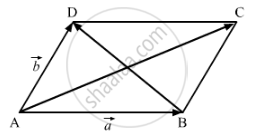Advertisements
Advertisements
प्रश्न
The adjacent sides of a parallelogram are represented by the vectors \[\vec{a} = \hat{i} + \hat{j} - \hat{k}\text{ and }\vec{b} = - 2 \hat{i} + \hat{j} + 2 \hat{k} .\]
Find unit vectors parallel to the diagonals of the parallelogram.
उत्तर

\[\vec{a} = \hat{i} + \hat{j} - \hat{k} \text{ and }\vec{b} = - 2 \hat{i} + \hat{j} + 2 \hat{k} .\]
\[\overrightarrow{AC} = \vec{a} + \vec{b} = - \hat{i} + 2 \hat{j} + \hat{k}\]
\[\text{Let the unit vector along the diagonals AC and BD of the parallelogram be }\widehat{AC}\text{ and }\widehat{BD} . \]
\[ \Rightarrow \widehat{AC} = \frac{- \hat{i} + 2 \hat{j} + \hat{k}}{\sqrt{6}}\]
\[\Rightarrow \widehat{BD} = \frac{- 3 \hat{i} + 3 \hat{k}}{3\sqrt{2}} = \frac{- \hat{i} + k}{\sqrt{2}}\]
APPEARS IN
संबंधित प्रश्न
Find the direction ratios of a vector perpendicular to the two lines whose direction ratios are -2, 1, -1, and -3, -4, 1.
Find the position vector of a point which divides the join of points with position vectors `veca-2vecb" and "2veca+vecb`externally in the ratio 2 : 1
If `bara, barb, barc` are position vectors of the points A, B, C respectively such that `3bara+ 5barb-8barc = 0`, find the ratio in which A divides BC.
Classify the following measures as scalar and vector.
10 kg
In Figure, identify the following vector.

Coinitial
`veca and -veca` are collinear.
Two vectors having the same magnitude are collinear.
Find the direction cosines of the vector joining the points A (1, 2, -3) and B (-1, -2, 1) directed from A to B.
Show that the vector `hati + hatj + hatk` is equally inclined to the axes OX, OY, and OZ.
Write down a unit vector in XY-plane, making an angle of 30° with the positive direction of the x-axis.
Let `veca` and `vecb` be two unit vectors, and θ is the angle between them. Then `veca + vecb` is a unit vector if ______.
Find a vector of magnitude 4 units which is parallel to the vector \[\sqrt{3} \hat{i} + \hat{j}\]
ABCD is a parallelogram. If the coordinates of A, B, C are (−2, −1), (3, 0) and (1, −2) respectively, find the coordinates of D.
Find the angle between the vectors \[\vec{a} \text{ and } \vec{b}\] where \[\vec{a} = \hat{i} - \hat{j} \text{ and } \vec{b} = \hat{j} + \hat{k}\]
Find the angle between the vectors \[\vec{a} \text{ and } \vec{b}\] \[\vec{a} = 3\hat{i} - 2\hat{j} - 6\hat{k} \text{ and } \vec{b} = 4 \hat{i} - \hat{j} + 8 \hat{k}\]
Find the angles which the vector \[\vec{a} = \hat{i} -\hat {j} + \sqrt{2} \hat{k}\] makes with the coordinate axes.
Dot product of a vector with \[\hat{i} + \hat{j} - 3\hat{k} , \hat{i} + 3\hat{j} - 2 \hat{k} \text{ and } 2 \hat{i} + \hat{j} + 4 \hat{k}\] are 0, 5 and 8 respectively. Find the vector.
If \[\left| \vec{a} + \vec{b} \right| = 60, \left| \vec{a} - \vec{b} \right| = 40 \text{ and } \left| \vec{b} \right| = 46, \text{ find } \left| \vec{a} \right|\]
Show that the vector \[\hat{i} + \hat{j} + \hat{k}\] is equally inclined to the coordinate axes.
Show that the vectors \[\vec{a} = \frac{1}{7}\left( 2 \hat{i} + 3 \hat{j} + 6 \hat{k} \right), \vec{b} = \frac{1}{7}\left( 3\hat{i} - 6 {j} + 2 \hat{k} \right), \vec{c} = \frac{1}{7}\left( 6 \hat{i} + 2 \hat{j} - 3 {k} \right)\] are mutually perpendicular unit vectors.
For any two vectors \[\vec{a} \text{ and } \vec{b}\] show that \[\left( \vec{a} + \vec{b} \right) \cdot \left( \vec{a} - \vec{b} \right) = 0 \Leftrightarrow \left| \vec{a} \right| = \left| \vec{b} \right|\]
If \[\vec{p} = 5 \hat{i} + \lambda \hat{j} - 3 \hat{k} \text{ and } \vec{q} = \hat{i} + 3 \hat{j} - 5 \hat{k} ,\] then find the value of λ, so that \[\vec{p} + \vec{q}\] and \[\vec{p} - \vec{q}\] are perpendicular vectors.
If either \[\vec{a} = \vec{0} \text{ or } \vec{b} = \vec{0}\] then \[\vec{a} \cdot \vec{b} = 0 .\] But the converse need not be true. Justify your answer with an example.
Show that the vectors \[\vec{a} = 3 \hat{i} - 2 \hat{j} + \hat{k} , \vec{b} = \hat{i} - 3 \hat{j} + 5 \hat{k} , \vec{c} = 2 \hat{i} + \hat{j} - 4 \hat{k}\] form a right-angled triangle.
Find the angles of a triangle whose vertices are A (0, −1, −2), B (3, 1, 4) and C (5, 7, 1).
If the vertices A, B and C of ∆ABC have position vectors (1, 2, 3), (−1, 0, 0) and (0, 1, 2), respectively, what is the magnitude of ∠ABC?
If A, B and C have position vectors (0, 1, 1), (3, 1, 5) and (0, 3, 3) respectively, show that ∆ ABC is right-angled at C.
Find the unit vector in the direction of vector \[\overrightarrow{PQ} ,\]
where P and Q are the points (1, 2, 3) and (4, 5, 6).
Show that the points \[A \left( 2 \hat{i} - \hat{j} + \hat{k} \right), B \left( \hat{i} - 3 \hat{j} - 5 \hat{k} \right), C \left( 3 \hat{i} - 4 \hat{j} - 4 \hat{k} \right)\] are the vertices of a right angled triangle.
If \[\vec{a} = \hat{i} + \hat{j} + \hat{k} , \vec{b} = 2 \hat{i} - \hat{j} + 3 \hat{k} \text{ and }\vec{c} = \hat{i} - 2 \hat{j} + \hat{k} ,\] find a unit vector parallel to \[2 \vec{a} - \vec{b} + 3 \vec{c .}\]
If \[\overrightarrow{AO} + \overrightarrow{OB} = \overrightarrow{BO} + \overrightarrow{OC} ,\] prove that A, B, C are collinear points.
The unit normal to the plane 2x + y + 2z = 6 can be expressed in the vector form as
Let (h, k) be a fixed point where h > 0, k > 0. A straight line passing through this point cuts the positive direction of the coordinate axes at the points P and Q. Then the minimum area of the ΔOPQ. O being the origin, is
The altitude through vertex C of a triangle ABC, with position vectors of vertices `veca, vecb, vecc` respectively is:
